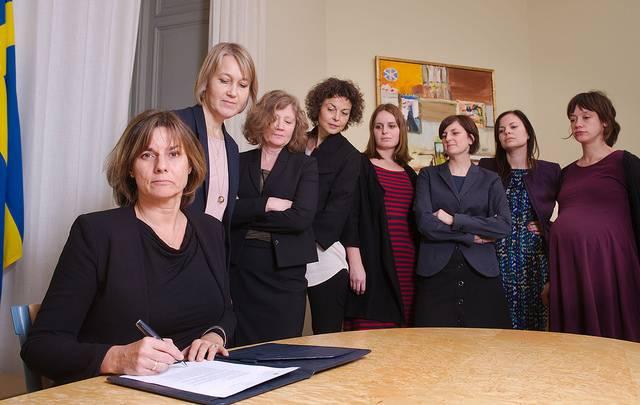
President Donald Trump may be poised to pull the U.S. out of the global climate agreement reached at COP21, but Sweden is charging ahead with its plan to transition toward a zero-carbon economy. This month its government announced that it would phase out all greenhouse gas emissions by 2045.
“Our target is to be an entirely fossil-fuel-free welfare state,” Climate Minister Isabella Lovin told Reuters in an interview earlier this month.
Surrounded by all women, Lovin signed the law during a photo opportunity many assumed was designed to troll Trump and his public signings of executive orders – while surrounded entirely by white men.
The law is expected to take effect in 2018. It would require the domestic transport sector to decrease its emissions by 70 percent by 2030. Domestic emissions are to be slashed by 85 percent, with the government setting new climate goals every four years. Any remaining emissions would be negated by investing in sustainable development projects abroad or planting trees to sequester carbon within the country.
Sweden’s latest move on climate change is another step taken in what the country’s government says has been a long legacy of environmental awareness and policy. The Nordic country of 9.6 million takes credit for what it calls the world’s first environmental protection agency, founded in 1967. The country’s wealth (depending on the source, it is near the top 10 of countries by per capita income) has allowed Sweden to finance its own climate fund, which has sponsored sustainable development projects from Armenia to Zambia.
The term “culture of innovation” is overused. But that phrase is more than appropriate in the case of Sweden. As Lovin explained in a recent speech, the country that birthed technologies from Skype to Spotify is also trying to foster technologies that could change the world in the coming decades. The government aggressively seeks out entrepreneurs in the clean-technology sector and supports various initiatives in order to advance next-generation technologies.
The results are all over the map. For example, the country has long pushed the development of dimethyl ether, a gas byproduct of biomass such as pulp and paper production that is often touted as a cleaner source of truck fuel.
Other transportation initiatives include what the country describes as the world’s first “electric road,” a 1.2-mile strip on which electric trucks run on conductive technology. Those same trucks can disconnect from the overhead wires and haul goods on other roads – or temporarily lower their rooftop power connectors when they need to pass a slow-moving vehicle on the electric road.
Sweden has aimed high on the environmental front, with the risk that the country could fall short of its goals unless it backs up its initiatives with investments. To that end, the Organization for Economic Co-Operation and Development (OECD) has warned that the country needs to ensure that citizens share this economic and policy “burden.” But at the same time, the OECD lauded the country for being a global “front-runner” in environmental stewardship.
Image credit: Sweden Green Party/Flickr

Leon Kaye has written for 3p since 2010 and become executive editor in 2018. His previous work includes writing for the Guardian as well as other online and print publications. In addition, he's worked in sales executive roles within technology and financial research companies, as well as for a public relations firm, for which he consulted with one of the globe’s leading sustainability initiatives. Currently living in Central California, he’s traveled to 70-plus countries and has lived and worked in South Korea, the United Arab Emirates and Uruguay.
Leon’s an alum of Fresno State, the University of Maryland, Baltimore County and the University of Southern California's Marshall Business School. He enjoys traveling abroad as well as exploring California’s Central Coast and the Sierra Nevadas.














